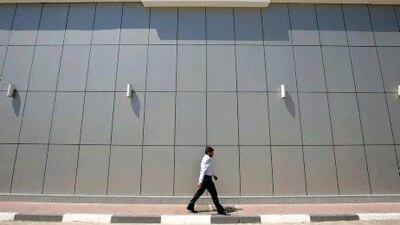Abu Dhabi Commercial Bank (ADCB) returned to profit last year, smashing past analysts' estimates of weaker gains despite putting aside more than Dh1 billion (US$272.2 million) as cover for the bank's losses from the restructuring of Dubai World.
The UAE's third-largest bank by assets saw net profits in the fourth quarter reach Dh371m, compared with a loss of Dh1.21bn last year. However, that quarter accounted for much of the bank's gains, with profits for the entire year at only Dh391m.
Sofia el Boury, a banking analyst at Shuaa Capital, said: "The bottom line is very strong performance, compared to both our estimates and consensus." Ala'a Eraiqat, the bank's chief executive, said: "2010 was a year of measured growth for ADCB. After a difficult 2009, the bank looked to solidify its position within the local banking market, and add scale and momentum to its business divisions where appropriate. The most significant development in 2010 was the successful acquisition of the UAE retail banking, wealth management and SME [small-to-medium-enterprises] businesses of The Royal Bank of Scotland."
An improvement on 2009 was to be expected for ADCB, which made a loss of Dh1.21bn in the final quarter of that year, dragging the bank's full-year earnings down to a loss of Dh513m. Murad Ansari, an analyst at EFG-Hermes, said the latest results showed strong growth of the bank's underlying business. "Net interest income has come in stronger than expected, probably driven by the consolidation with RBS's operations. The loans-to-deposits ratio has come down to a much more manageable level. Clearly the efforts that management has been making are paying off. Remember that they had a ratio above 135 per cent last year," Mr Ansari said.
Levels of provisioning remained high at Dh3.28bn for 2010, decreasing 12 per cent from last year, including Dh1.05bn booked for the bank's exposure to the restructuring of the troubled conglomerate Dubai World.
The total impairment provisions also included Dh554m for the Saad and Al Gosaibi groups, two Saudi conglomerates that defaulted in 2009.
The UAE Central Bank has mandated that all banks raise their provisioning levels for these two companies, as well as changing the classification of non-performing loans to require that banks put aside provisions within 90 days of a debtor missing a payment.
Including the exposure to Dubai World, the ratio of non-performing loans stood at 11.1 per cent of the bank's total loan book.
However, Mr Murad said that although the Dubai World and Saad and Al Gosaibi Group provisions had been expected by the market, the bank's non-performing loan ratio remained stubbornly high.
"It doesn't look like non-performing loans have yet peaked," he warned.

